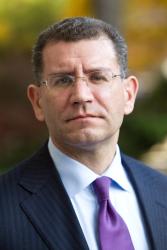

12:30 pm EDT - 2:00 pm EDT
Past Event
On March 26, 2010, the Saban Center for Middle East Policy at Brookings hosted a policy luncheon discussion with former Israeli Ambassador to the United States and current Bronfman Distinguished Nonresident Senior Fellow Itamar Rabinovich. The discussion focused on many points made in a May 2010 Saban Center Middle East Memo authored by Rabinovich. Rabinovich discussed the challenges and opportunities facing the United States and Israel in dealing with Syria, both in terms of the American-Syrian bilateral relationship and Israeli-Syrian peace negotiations. Rabinovich assessed the Obama administration’s performance thus far in dealing with Syria, examined the likelihood that Israel would push for negotiations with Syria, and analyzed President Bashar al-Asad’s policies relative to those of his father, Hafiz al-Asad. Rabinovich concluded with recommendations on how the American administration and Israeli government should deal with Syria in order to secure better relations and create the potential for an Israeli-Syrian peace agreement.
Rabinovich began by saying that when Barack Obama was a presidential candidate, he spoke of engaging Syria, yet has thus far not done so; instead, his administration has focused on the Palestinian track. In Israel, Benjamin Netanyahu’s government has also not dedicated much time to the Syrian track; but Rabinovich said that the possibility that Netanyahu would change his mind should not be ruled out. However, there would be a big obstacle facing Netanyahu should he decide to pursue negotiations with Damascus—he cannot proceed with negotiations with the current governing coalition and would need to break from his own party, as former Prime Minister Ariel Sharon did. Although Netanyahu is preoccupied with the Iran issue, in which Syria plays a critical role, he still may not be willing to restart negotiations with Syria.
Rabinovich discussed how Bashar al-Asad would react to a resumption of talks, and what the United States and Israel would expect of him. If Washington were to offer Bashar better relations, and Jerusalem were to offer him a peace settlement, both sides would expect him to engage in public diplomacy toward Israel, which his father, Hafiz, did not always undertake. Rabinovich contrasted Hafiz al-Asad with President Anwar Sadat of Egypt, saying that Sadat managed to convince the Israeli public that Egypt was no longer an enemy. Because Bashar understands the importance of the media and of influencing public opinion in democratic countries, he may be more adept at public diplomacy than was his father.
Rabinovich said that ultimately Asad does not just want the Golan Heights returned to Syria, he wants U.S. acceptance and the opportunity to be an interlocutor of U.S. policy in the Middle East. However, despite these interests, Rabinovich said, Asad would likely consider U.S. and Israeli demands for Damascus to break ties with Tehran, Hizballah, and Hamas as illegitimate. This stance would be a major obstacle to improving Syria’s relationships with the United States and Israel.
Rabinovich explained why previous attempts at improving Syria’s relationship with the United States and Israel failed. During Hafiz al-Asad’s rule, the Clinton administration lacked diplomatic leverage, and Prime Minister Ehud Barak negotiated with Damascus as Hafiz al-Asad was dying; the Syrian leader had other concerns on his mind, specifically, setting the groundwork for a transition of power to his son. When Bashar assumed power, talks went on hold because neither George W. Bush nor Ariel Sharon had an interest in pursuing negotiations with Syria. When negotiations did resume via Turkish mediation during Ehud Olmert’s latter years in office, it was difficult to make serious progress because Olmert was an outgoing prime minister plagued by domestic problems. Regarding current Turkish efforts at mediation, Rabinovich said that a Turkish role would be beneficial, but that the United States must manage Israeli-Syrian negotiations. Rabinovich concluded by saying that while improving the American-Syrian relationship and negotiating an Israeli-Syrian peace settlement would be challenges, both are doable.


Madiha Afzal, Marsin Alshamary, Aslı Aydıntaşbaş, Pavel K. Baev, Sarah A. Binder, E.J. Dionne, Jr., Vanda Felbab-Brown, William A. Galston, Sharan Grewal, Ryan Hass, Tanvi Madan, Suzanne Maloney, Gian Maria Milesi-Ferretti, Itamar Rabinovich, Natan Sachs, Jaganath Sankaran, David Wessel, Andrew Yeo
April 15, 2024

Suzanne Maloney
April 8, 2024

Vanda Felbab-Brown, Jeffrey Feltman, Sharan Grewal, Steven Heydemann, Marvin Kalb, Patricia M. Kim, Tanvi Madan, Suzanne Maloney, Allison Minor, Bruce Riedel, Natan Sachs, Valerie Wirtschafter
April 5, 2024